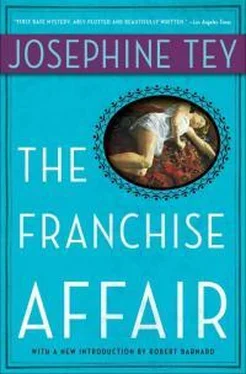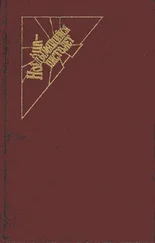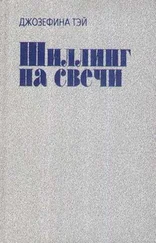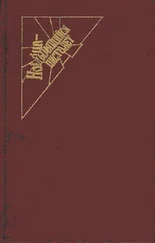The gates were wide open and the courtyard – bright in the flames – was crowded with the men and machines of the Fire Service. The first thing he saw, incongruous on the grass, was the bead-work chair from the drawing-room; and a wave of hysteria rose in him. Someone had saved that, anyhow.
An almost unrecognisable Stanley grabbed his sleeve and said: “There you are. I thought you ought to know, somehow.” Sweat trickled down his blackened face, leaving clear rivulets behind them, so that his young face looked seamed and old. “There isn’t enough water. We’ve got quite a lot of the stuff out. All the drawing-room stuff that they used every day. I thought that’s what they’d want, if it had to be a choice. And we flung out some of the upstairs stuff but all the heavy stuff has gone up.”
Mattresses and bed-linen were piled on the grass out of the way of the firemen’s boots. The furniture stood about the grass as it had been set down, looking surprised and lost.
“Let’s take the furniture further away,” Stanley said. “It’s not safe where it is. Either some lighted bits will fall on it or one of those bastards will use it to stand on.” The bastards were the Fire Service, doing their sweating and efficient best.
So Robert found himself prosaically carting furniture through a fantastic scene; miserably identifying pieces that he had known in their proper sphere. The chair that Mrs. Sharpe had considered Inspector Grant too heavy for; the cherry-wood table they had given Kevin luncheon at; the wall-table that Mrs. Sharpe had dumped her bag down on only a few hours ago. The roar and crackle of the flames, the shoutings of the firemen, the odd mixture of moonlight, head-lights, and wavering flame, the mad juxtaposition and irrelevance of the bits of furniture, reminded him of how it felt to be coming round from an anaesthetic.
And then two things happened together. The first floor fell in with a crash. And as the new spout of flame lit the faces round him he saw two youths alongside whose countenances were alive with gloating. At the same moment he became aware that Stanley had seen them too. He saw Stanley’s fist catch the further one under the chin with a crack that could be heard even over the noise of the flames, and the gloating face disappeared into the darkness of the trampled grass.
Robert had not hit anyone since he gave up boxing when he left school, and he had no intention of hitting anyone now. His left arm seemed to do all that was necessary of its own accord. And the second leering face went down into obscurity.
“Neat,” remarked Stanley, sucking his broken knuckles. And then, “Look!” he said.
The roof crumpled like a child’s face when it is beginning to cry; like a melting negative. The little round window, so famous and so ill-reputed, leaned forward a little and sank slowly inwards. A tongue of flame leapt up and fell again. Then the whole roof collapsed into the seething mass below, falling two floors to join the red wreck of the rest of the interior. The men moved back from the furnace heat. The fire roared in unrestricted triumph into the summer night.
When at last it died away Robert noticed with a vague surprise that the dawn had come. A calm, grey dawn, full of promise. Quiet had come too; the roar and the shoutings had faded to the soft hiss of water on the smoking skeleton. Only the four walls stood, blurred and grimy, in the middle of the trampled grass. The four walls and the flight of steps with their warped iron railing. On either side of the doorway stood what remained of Nevil’s gay little tubs, the soaked and blackened flowers hanging in unrecognisable shreds over their edges. Between them the square opening yawned into a black emptiness.
“Well,” said Stanley, standing beside him, “that seems to be that.”
“How did it begin?” asked Bill, who had arrived too late to see anything but the wreck that was left.
“No one knows. It was well alight when P.C. Newsam arrived on his beat,” Robert said. “What became of those two chaps, by the way?”
“The two we corrected?” Stanley said. “They went home.”
“It’s a pity that expression is no evidence.”
“Yes,” Stanley said. “They won’t get anyone for this any more than they got anyone for the window-breaking. And I still owe someone for a crack on the head.”
“You nearly broke that creature’s neck tonight. That ought to be some kind of compensation to you.”
“How are you going to tell them?” Stanley said. This obviously referred to the Sharpes.
“God knows,” Robert said. “Am I to tell them first and let it spoil their triumph in court for them; or am I to let them have their triumph and face the awful come-down afterwards?”
“Let them have their triumph,” Stanley said. “Nothing that happens afterwards can take that away from them. Don’t mess it up.”
“Perhaps you are right, Stan. I wish I knew. I had better book rooms at the Rose and Crown for them.”
“They wouldn’t like that,” Stan said.
“Perhaps not,” Robert said, a shade impatiently. “But they have no choice. Whatever they decide to do they will want to stay here a night or two to arrange about things, I expect. And the Rose and Crown is the best available.”
“Well,” Stanley said, “I’ve been thinking. And I’m sure my landlady would be glad to have them. She’s always been on their side, and she has a spare room, and they could have that sitting-room in front that she never uses, and it’s very quiet down there, that last row of Council houses facing on the Meadows. I’m sure they’d rather have that than a hotel where they would be stared at.”
“They would indeed, Stan. I should never have thought of it. You think your landlady would be willing?”
“I don’t think; I’m sure. They’re her greatest interest in life at the moment. It would be like royalty coming to stay.”
“Well, find out definitely, would you, and telephone me a message to Norton. To The Feathers at Norton.”
I t seemed to Robert at least half Milford had managed to pack itself into the Court at Norton. Certainly a great many citizens of Norton were milling round the outer doors, vocal and frustrated; furious that when a case of national interest was being decided at “their” Assizes they should be done out of their right to witness it by an influx of foreigners from Milford. Wily and deceitful foreigners, too, who had suborned the Norton youth to keep places in the queue for them; a piece of forethought which had not occurred to Norton adults.
It was very warm, and the packed court stirred uneasily throughout the preliminaries and through most of Miles Allison’s account of the crime. Allison was the antithesis of Kevin Macdermott; his fair, delicate face that of a type rather than a person. His light dry voice was unemotional, his method matter-of-fact. And since the story he was telling was one which they had all read about and discussed until it was threadbare, they withheld their attention from him and amused themselves by identifying friends in court.
Robert sat turning over and over in his pocket the little oblong of pasteboard that Christina had pressed into his hand on his departure yesterday, and rehearsing phrases for afterwards. The pasteboard was a bright Reckitt’s blue and bore in gold letters the words: NOT A SPARROW SHALL FALL, and a picture in the right upper corner of a robin with an out-size red breast. How, wondered Robert, turning the little text over and over in his fingers, did you tell someone that they had no home any more?
The sudden movement of a hundred bodies and the subsequent silence brought him back to the court-room, and he realised that Betty Kane was taking the oath preparatory to giving evidence. “Never kissed anything but the book,” Ben Carley had said of her appearance on a similar occasion. And that is what she looked like today. The blue outfit still made one think of youth and innocence; speedwell, and camp-fire smoke, and harebells in the grass. The tilted-back brim of her hat still showed the childish forehead with its charming hair line. And Robert, who knew now all about her life in the weeks she was missing, found himself being surprised all over again at sight of her. Plausibility was one of the first endowments of the criminal; but up to now such plausibility as he had had to deal with was of the old-soldier-ten-bob-note kind. Easily recognised for what it was. The work of amateurs at the job. It occurred to him that for the first time he was seeing the real thing at work.
Читать дальше
Конец ознакомительного отрывка
Купить книгу












